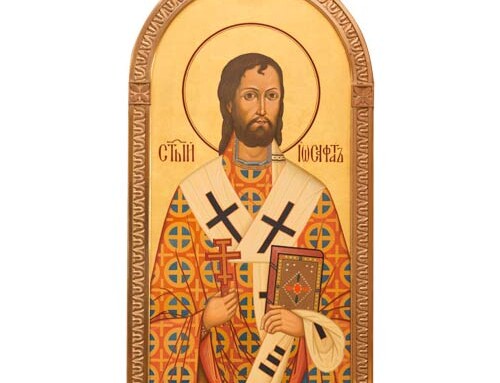St. Josaphat – Canonized Saint
There are thousands of different saints in heaven, some of whom are nameless. However, we have a family of saints who, during their earthly lives, were distinguished by great holiness and heroic virtues of the love of God and neighbor. After their death, the Lord God glorified them with miracles, and the holy Church brought them to the altars of the saints and instructed them to be spiritually remembered. One such saint is our holy martyr Josaphat.
He entered the road of holiness as a young man from the minute a spark of love fell from Christ’s Crucifixion on his innocent childish heart. That spark never faded away, but over the years it broke out into a great fire of love for God and neighbor. The desire for holiness led him to the Basilian monastery in Vilnius. There he grew rapidly in holiness through a love of prayer and reflection, through various penitential deeds, and because of a love for our Eastern Rite Church. He studied the church books, which describe the life and deeds of saints and holy martyrs. From those books, he learned about holiness, our holy faith, and drew great love for our services, ordinances, and the Church. Of all the spiritual practices, he loved the holy Liturgy the most. As a monk, he gladly served in it, and as a priest or bishop, he served it with angelic piety. Under the feet of the Eucharistic Jesus, he prayed for hours, and sometimes most of the night.
After becoming a priest and then a bishop, he burned himself completely, like a candle, in the service of God and his neighbor. His spirit of sacrifice for God’s glory and the salvation of souls is viewed by his own and others, and even enemies. His holiness, after his death, was confirmed by the oath of more than 150 witnesses. Metropolitan Joseph Veljamin of Rutsky, informing the Apostolic See of the death of St. Josaphat in his letter of December 23, 1623, says: ‘I am pained that they physically took from me someone who was my right hand… but I have some hope that he will act in our favor far more in heaven than he could do on earth because this holy martyr gave his life for the glory of God, for the holy Unity, for the power of the Apostolic See.’ Alexander Tyshkevych, chief judge of the land of Polotsk, who knew St. Josaphat at the time of his episcopate and often spoke to him, in 1628 confessed under oath: ‘I know that the servant of God Josaphat was considered and today is considered to be the holy and great servant of God, and for such a time he will be honored.
The Lord God glorified St. Josaphat with various miracles after his death. These miracles occurred immediately after his martyrdom. Notable miracles include the incorruptibility of his body for a long time, the conversion of almost all his murderers, and the conversion of the Orthodox bishop Meletius Smotrytsky, the true culprit in the death of St. Josaphat. There have been many miraculous conversions and miraculous healings, such as the return of vision to the blind, the cure of heart disease, paralysis, or salvation from various dangers. All these things were checked by the Church and confirmed by oath by those who experienced those miracles on themselves or were eyewitnesses. The confessor of St. Josaphat, Fr. Gennady Khmelnytsky, in 1628 recalls: “They come to his tomb from everywhere, everyone conscripts his intercession, and through him great graces and miracles are performed.
So it is not surprising that the holy Church, after carrying out several very strict trials on the life of St. Josaphat, by the hands of Pope Pius IX, on June 29, 1867, placed a crown of saints on the head of St. Josaphat. ‘Pius, bishop, servant of the servants of God…,’ says the canonization bull, ‘the aforementioned Blessed Josaphat, archbishop of Polotsk, the Ruthenian Rite, from the Order of St. Basil the Great, decided to be a saint and entered into the list of holy martyrs.’”
Julian Katriy OSBM, “KNOW YOUR RITE”
СВЯТИЙ ЙОСАФАТ – КАНОНІЗОВАНИЙ СВЯТИЙ
У небі є тисячі й тисячі різних святих. Це безіменні святі. Та маємо рід святих, які за земного життя відзначилися великою святістю і геройськими чеснотами любови Бога і ближнього, яких Господь Бог після їхньої смерти прославив чудами, а свята Церква винесла їх на престоли святих і доручила їх почитати. І до них якраз належить наш священномученик Йосафат.
Він вступив на дорогу святости ще малим хлопчиною від хвилини, коли з Христового Розп’яття впала іскра любови на його невинне дитяче серце. Та іскра вже ніколи не згасла але з роками розгорілася у великий вогонь любови до Бога і ближнього. Бажання святости веде його до василіянського монастиря у Вільні. Тут він швидко зростає у святості через любов до молитви і роздуми, через різні покутні діла та через любов до нашого церковного правила, яке з часом вивчає напам’ять. Тут він вчитується в церковні книги, у яких описано життя та вчинки святих і святих мучеників. З тих книг він вчиться святости, пізнає нашу святу віру та черпає велику любов до наших богослужень, обряду й Церкви. З усіх духовних практик він найбільше любить святу Літургію, на якій як монах радо служить, а відтак як священик чи єпископ служить її з ангельською набожністю. У стіп Євхаристійного Ісуса він молиться цілими годинами, а деколи й велику частину ночі.
Ставши священиком, а відтак єпископом, він повністю, наче та свічка, спалює себе у служінні Богові та ближньому. Його духу ревности й жертви для Божої слави і спасення душ подивляють свої й чужі і навіть вороги. Його святість після смерти підтвердили присягою понад 150 свідків. Митрополит Йосиф Велямин Рутський, повідомляючи Апостольську Столицю про смерть святого Йосафата у своєму листі від 23 грудня 1623 року каже: “Болію над тим, що забрали мені фізично того, хто був моєю правою рукою… та маю певну надію, що він діятиме на нашу користь далеко сильніше в небі, ніж міг це зробити на землі тому, що цей святий мученик життя своє віддав за славу Божу, за святе З’єдинення, за владу Апостольського Престолу”. А Олександр Тишкевич, головний суддя полоцької землі, який знав святого Йосафата увесь час його єпископства й часто з ним розмовляв, у 1628 р. зізнає під присягою: “Знаю, що слугу Божого Йосафата вважали й сьогодні вважають за святого та великого Божого слугу і за такого його почитають”.
Та найбільш достовірний свідок святости святого Йосафата – це сам Господь Бог, що після його смерти прославив його різними чудами. Вони відбуваються відразу після його мученицької смерти. До визначних чудес належить передусім нетлінність його тіла протягом тривалого часу, навернення майже всіх його вбивць та навернення православного єпископа Мелетія Смотрицького, справжнього винуватця смерті святого Йосафата. Відбулось багато-багато чудесних навернень і чудесних оздоровлень, а саме: повернення зору незрячим, виліковування недуги серця, паралічу чи рятування з різних небезпек. Усе те перевірила Церква і підтверджено присягою тими, хто ті чудеса на собі відчув або був свідком-очевидцем. Сповідник святого Йосафата о. Геннадій Хмельницький у 1628 році згадує: “До його гробу приходять звідусіль, усі призивають його заступництва, і через нього діються великі ласки й чуда”.
Тож нічого дивного, що свята Церква після проведення кількох дуже строгих процесів над життям святого Йосафата, руками Папи Пія IX, 29 червня 1867 року поклала на голову святого Йосафата вінець святих: “Пій, єпископ, слуга слуг Божих…, – каже канонізаційна булла, – згаданого блаженного Йосафата, архиєпископа полоцького, руського обряду, з Чину Святого Василія Великого, бути святим вирішили та й у список святих мучеників вписали”.
Юліян Катрій, ЧСВВ, “ПІЗНАЙ СВІЙ ОБРЯД”

